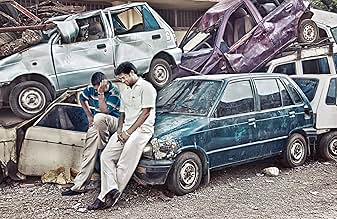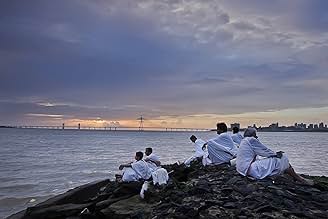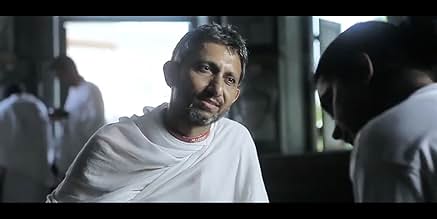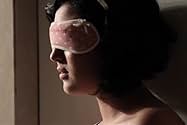AVALIAÇÃO DA IMDb
8,0/10
8,1 mil
SUA AVALIAÇÃO
O filme explora questões de identidade, justiça, beleza, significado e morte por meio de um fotógrafo experimental, um monge doente e um jovem corretor da bolsa.O filme explora questões de identidade, justiça, beleza, significado e morte por meio de um fotógrafo experimental, um monge doente e um jovem corretor da bolsa.O filme explora questões de identidade, justiça, beleza, significado e morte por meio de um fotógrafo experimental, um monge doente e um jovem corretor da bolsa.
- Direção
- Roteiristas
- Artistas
- Prêmios
- 12 vitórias e 13 indicações no total
Aydah El-Kashef
- Aliya
- (as Aida El-Kashef)
Yogesh Shah
- Doctor
- (as Dr. Yogesh Shah)
Avaliações em destaque
Anand Gandhi's first feature-length film is an intriguing and thought-provoking piece of Independent cinema; it deals with life, purpose and philosophy. Gandhi's prior experience with short films helps him direct the three disparate story lines with certain finesse; the stories shed some light on Theseus's Paradox and give a transcendent look at consequences arising from individual actions.
In Greek Legend, according to Plutarch, Theseus's ship was preserved, and the decayed parts were replaced piece by piece until no part of the original ship remained. Plutarch asks whether you would call it the same ship or not. The paradox might seem too confusing to discuss, but Anand Gandhi just uses this to connect the three plots through the theme of organ donation, questioning identity in the face of change. Rather than making a statement, Gandhi just raises interest and discusses various important philosophies and issues; having compelling arguments for and against the topics, it helps us being a part of the discussion.
The characters are likable and interesting. All the actors have done a commendable job, and Neeraj Kabi's brilliant performance as the Jain monk stands out. As the three stories go, the first one (with the blind Egyptian photographer) deals with behaviour to change, the second one (with the animal-rights supporting Jain monk) might seem more philosophically and intellectually orgasmic, but it's the third one (with a stock broker seeking justice for a kidney scam victim) which oozes with brutal honesty. The use of humour to lighten the serious tone of the movie is delightful.
The cinematography is spectacular. Rarely have I seen such breathtaking visuals in an Independent film; the shots have a certain poetic and aesthetic charm. The blend of far-off shots and sudden close-ups gives us an intimate look at the characters' lives.
The movie is really good, but far from perfection. 2 hours 20 minutes is too long for the movie; with better editing, it could have maintained the pace and momentum well. And as most movies with multiple story lines suffer from this, the characters lack enough depth and screen-time for us to invest ourselves in them. The first story, though the idea of a blind photographer is a bit far-fetched, suffers from an abrupt ending. The second story has many interesting viewpoints and arguments, but part of them seem off-the-book and pretentious; it suffers from an illogical ending too. The third story, though quite honest and absorbing, is quite messy and detours from the main theme of the movie.
From writing screenplay and dialogues for cheesy soap operas to an intellectual independent feature film, Anand Gandhi has come a long way; I guess his experience as a playwright and short-film director must have come in handy.
In Greek Legend, according to Plutarch, Theseus's ship was preserved, and the decayed parts were replaced piece by piece until no part of the original ship remained. Plutarch asks whether you would call it the same ship or not. The paradox might seem too confusing to discuss, but Anand Gandhi just uses this to connect the three plots through the theme of organ donation, questioning identity in the face of change. Rather than making a statement, Gandhi just raises interest and discusses various important philosophies and issues; having compelling arguments for and against the topics, it helps us being a part of the discussion.
The characters are likable and interesting. All the actors have done a commendable job, and Neeraj Kabi's brilliant performance as the Jain monk stands out. As the three stories go, the first one (with the blind Egyptian photographer) deals with behaviour to change, the second one (with the animal-rights supporting Jain monk) might seem more philosophically and intellectually orgasmic, but it's the third one (with a stock broker seeking justice for a kidney scam victim) which oozes with brutal honesty. The use of humour to lighten the serious tone of the movie is delightful.
The cinematography is spectacular. Rarely have I seen such breathtaking visuals in an Independent film; the shots have a certain poetic and aesthetic charm. The blend of far-off shots and sudden close-ups gives us an intimate look at the characters' lives.
The movie is really good, but far from perfection. 2 hours 20 minutes is too long for the movie; with better editing, it could have maintained the pace and momentum well. And as most movies with multiple story lines suffer from this, the characters lack enough depth and screen-time for us to invest ourselves in them. The first story, though the idea of a blind photographer is a bit far-fetched, suffers from an abrupt ending. The second story has many interesting viewpoints and arguments, but part of them seem off-the-book and pretentious; it suffers from an illogical ending too. The third story, though quite honest and absorbing, is quite messy and detours from the main theme of the movie.
From writing screenplay and dialogues for cheesy soap operas to an intellectual independent feature film, Anand Gandhi has come a long way; I guess his experience as a playwright and short-film director must have come in handy.
Ship of Theseus is a movie which we need but didn't really deserve right now. A lot of things have already been said about it, so with the risk of sounding repetitive, however I'll try not to be so, here are some of my thoughts: 1. To begin with, Anand Gandhi has made an utterly brilliant movie. The honesty, genuineness, and intent of the director is clear from the word go which is a sheer pleasure to see in an Indian filmmaker.
2. Three stories - totally different to each others in terms of mood and narration, yet so well transitioned that you don't even notice it. Two thumbs up for the screenplay and editing.
3. Utterly brilliant cinematography, a visual delight which mesmerizes you and grips you with every scene and its details that is on the screen. After I exited the theater, I couldn't believe I watched an Indian movie looking so beautiful. In fact, I can go on and on about the imagery. Well done! 4. Superb dialogues (and the use of no dialogues) - At times, zen, and other times, so passionate that you feel like talking to your alter ego, just like, the conversations in Zen and the Art of Motorcycle Maintenance. Even the humorous and satirical parts don't make you feel like they are used as punches, except a couple times maybe.
5. Acting - Top notch by the all three protagonists. Relatively good performance by the other actors as well. But the three main actors are so good you long to see more of them. And the sympathies and your connections with them find their peaks in the penultimate scene.
6. Only thing where I felt I had issue is that some scenes and conversations were finished in a hurry. While one talk about something so powerful in detail, it should be a complete conversation, whereas, at times, it appears a lot of important things were skipped (esp. in story #2). Though I didn't find too many things wrong with the conversations in story 2 and narrations in story 2 and 3, it looked to me that something was amiss, they could have talked a little more, and so on. The movie could have been even more powerful, given the premise and ideas it began with. Actually, the idea is itself so big and extensive that any less would feel like incomplete. Such as, writing about this movie in 140 characters. But I guess I shouldn't complain as it's a movie where it's very difficult to have such kind of narration as well as a speech as long as that of John Galt. Anyways, I am more than glad that such things were talked about in a movie made in India.
Bravo, Anand Gandhi and the team! I stood and clapped for you all when the movie ended in the theater.
2. Three stories - totally different to each others in terms of mood and narration, yet so well transitioned that you don't even notice it. Two thumbs up for the screenplay and editing.
3. Utterly brilliant cinematography, a visual delight which mesmerizes you and grips you with every scene and its details that is on the screen. After I exited the theater, I couldn't believe I watched an Indian movie looking so beautiful. In fact, I can go on and on about the imagery. Well done! 4. Superb dialogues (and the use of no dialogues) - At times, zen, and other times, so passionate that you feel like talking to your alter ego, just like, the conversations in Zen and the Art of Motorcycle Maintenance. Even the humorous and satirical parts don't make you feel like they are used as punches, except a couple times maybe.
5. Acting - Top notch by the all three protagonists. Relatively good performance by the other actors as well. But the three main actors are so good you long to see more of them. And the sympathies and your connections with them find their peaks in the penultimate scene.
6. Only thing where I felt I had issue is that some scenes and conversations were finished in a hurry. While one talk about something so powerful in detail, it should be a complete conversation, whereas, at times, it appears a lot of important things were skipped (esp. in story #2). Though I didn't find too many things wrong with the conversations in story 2 and narrations in story 2 and 3, it looked to me that something was amiss, they could have talked a little more, and so on. The movie could have been even more powerful, given the premise and ideas it began with. Actually, the idea is itself so big and extensive that any less would feel like incomplete. Such as, writing about this movie in 140 characters. But I guess I shouldn't complain as it's a movie where it's very difficult to have such kind of narration as well as a speech as long as that of John Galt. Anyways, I am more than glad that such things were talked about in a movie made in India.
Bravo, Anand Gandhi and the team! I stood and clapped for you all when the movie ended in the theater.
"Whether the ship would remain the same if it were entirely replaced, piece by piece. What would happen if their original planks were gathered up after they were replaced, and used to build a second ship. Which ship, if either, is the Ship of Theseus'."
Ship of Theseus starts by stating the Theseus' paradox and then moves on, leaving the viewers struggling to find the answer of this paradox. SOT is based upon three stories which raises questions on Existence, Identity, Humanity and Karma.
The first story is about a girl named Aaliya Kamal (Aida El-Kashef) who took photography after she lost her eyesight to a cornea infection and when she is asked "Do you feel limited?", she replies "Uhh.. No. Why is it so amazing not to have limits and doubts?". This is the part where each and every frame of the film looks stunning and exceptionally beautiful. There is no story in this part but it's about the perception of beauty, how black and white can be the most colorful combination and how a person loses her comfort when she gets her vision back. Aida plays with her eyes and did a great job with her part. Watch out for her body movements when she hears distinct voices during her photo sessions. Pankaj Kumar (director of photography) does an excellent job and his part gives real definition to the movie's aesthetic value. The sequence where Aaliya starts seeing her photographs when she gets her vision back is another highlight of the movie. Ah!!! Those photographs were just mind blowing.
The second story shows an ailing monk, Maitreya (Neeraj Kabi) who is suffering from Liver Cirrhosis and is fighting against pharmaceutical companies which performs cruelty against animals for the sake of experiments. It's the part where questions are raised about Karma, Religions and Beliefs. The moment where Chakrava (Vinay Shukla) asks the monk, when he is restricting himself to take medications to support his protest, "What about the violence you are committing on yourself by not taking medication?. And how is your choice not different from a suicide bomber who is so convinced about the fundamentalism of his political and religious thoughts?" and so many points that he makes e.g., "what if the caterpillar's karma was to get crushed" sequence and the fungus-making- an-ant-a-zombie-to-reap-benefits-out-of-it-concept defines this part and we, the viewers get puzzled with each and every words what this character says. It apparently questions the monk's beliefs and his karma. This is a part where to some extent dullness appears just before the interval but goes to another level when it ends in the second half.Neeraj Kabi is exceptionally well in his role of a monk. Hats off to him for the workout he did for this role.
The final part takes the whole movie to another level by asking questions on humanity and why the poor always gets crushed by the rich peoples. It's a story of a stockbroker who is the recipient of a kidney, which he later discovers that it was stolen from a labor who has been part of a racket which was led by highly esteemed doctors. It changes his life's perspective and then he goes to help that poor and make things better for him. This part is totally gripping and will be highly likable by many peoples. An exceptional performance by Sohum Shah makes this part even better.
Ship Of Theseus didn't waste any time on character development. It starts from the middle of the characters' life and doesn't tell you about their ending. But it tells you the way their perception gets changed about their life.
At the start I was thinking about the title. But when the film ended I thought that this is the most appropriate title which a movie could ever have. Anand Gandhi provides us a movie of the decade and is certainly going to give Indian Cinema a new definition. He is a talent to watch out for.
I am going with 4.5 stars for Ship Of Theseus. It's not run of the mill kind of movie but if you are a movie fanatic then it's totally your cup of tea. MISS IT AT YOUR OWN RISK!.
P.S:- Twitter was heavily flooded with the praises of Ship Of Theseus, but I was skeptical regarding those.
But now the one tweet which I totally found appropriate for the movie is "After watching the movie, do a blood test. You will find the traces of the film in it".
Ship of Theseus starts by stating the Theseus' paradox and then moves on, leaving the viewers struggling to find the answer of this paradox. SOT is based upon three stories which raises questions on Existence, Identity, Humanity and Karma.
The first story is about a girl named Aaliya Kamal (Aida El-Kashef) who took photography after she lost her eyesight to a cornea infection and when she is asked "Do you feel limited?", she replies "Uhh.. No. Why is it so amazing not to have limits and doubts?". This is the part where each and every frame of the film looks stunning and exceptionally beautiful. There is no story in this part but it's about the perception of beauty, how black and white can be the most colorful combination and how a person loses her comfort when she gets her vision back. Aida plays with her eyes and did a great job with her part. Watch out for her body movements when she hears distinct voices during her photo sessions. Pankaj Kumar (director of photography) does an excellent job and his part gives real definition to the movie's aesthetic value. The sequence where Aaliya starts seeing her photographs when she gets her vision back is another highlight of the movie. Ah!!! Those photographs were just mind blowing.
The second story shows an ailing monk, Maitreya (Neeraj Kabi) who is suffering from Liver Cirrhosis and is fighting against pharmaceutical companies which performs cruelty against animals for the sake of experiments. It's the part where questions are raised about Karma, Religions and Beliefs. The moment where Chakrava (Vinay Shukla) asks the monk, when he is restricting himself to take medications to support his protest, "What about the violence you are committing on yourself by not taking medication?. And how is your choice not different from a suicide bomber who is so convinced about the fundamentalism of his political and religious thoughts?" and so many points that he makes e.g., "what if the caterpillar's karma was to get crushed" sequence and the fungus-making- an-ant-a-zombie-to-reap-benefits-out-of-it-concept defines this part and we, the viewers get puzzled with each and every words what this character says. It apparently questions the monk's beliefs and his karma. This is a part where to some extent dullness appears just before the interval but goes to another level when it ends in the second half.Neeraj Kabi is exceptionally well in his role of a monk. Hats off to him for the workout he did for this role.
The final part takes the whole movie to another level by asking questions on humanity and why the poor always gets crushed by the rich peoples. It's a story of a stockbroker who is the recipient of a kidney, which he later discovers that it was stolen from a labor who has been part of a racket which was led by highly esteemed doctors. It changes his life's perspective and then he goes to help that poor and make things better for him. This part is totally gripping and will be highly likable by many peoples. An exceptional performance by Sohum Shah makes this part even better.
Ship Of Theseus didn't waste any time on character development. It starts from the middle of the characters' life and doesn't tell you about their ending. But it tells you the way their perception gets changed about their life.
At the start I was thinking about the title. But when the film ended I thought that this is the most appropriate title which a movie could ever have. Anand Gandhi provides us a movie of the decade and is certainly going to give Indian Cinema a new definition. He is a talent to watch out for.
I am going with 4.5 stars for Ship Of Theseus. It's not run of the mill kind of movie but if you are a movie fanatic then it's totally your cup of tea. MISS IT AT YOUR OWN RISK!.
P.S:- Twitter was heavily flooded with the praises of Ship Of Theseus, but I was skeptical regarding those.
But now the one tweet which I totally found appropriate for the movie is "After watching the movie, do a blood test. You will find the traces of the film in it".
Review #2.
Ship of Theseus is a very different cinematic experience. It moves you, it makes you think about life in a different way. The characters, the narrative don't ever leave you. Anand Gandhi is definitely a talent to look out for.
There are three different stories. Each with a different plot but same destination. The first one brings you in life of a girl who had lost her eyesight due to cornea and does photography. The second one is about a monk who should have an organ transplant. And the third one is about a stockbroker who just had a kidney transplant.
The stories instantaneously connect with you. It's hard to decide which one of the three is the best. I would say the three altogether make one of the finest movies ever made in India. And it would not be wrong to say that it is the best Indian movie of the year.
The performances are very real. Specially Neeraj Sir. The direction and cinematography are exceptional.
At last, I would like to say that It is not a usual Indian movie. Go with your brains and you'll experience something you've never experienced before.
Ship of Theseus is a very different cinematic experience. It moves you, it makes you think about life in a different way. The characters, the narrative don't ever leave you. Anand Gandhi is definitely a talent to look out for.
There are three different stories. Each with a different plot but same destination. The first one brings you in life of a girl who had lost her eyesight due to cornea and does photography. The second one is about a monk who should have an organ transplant. And the third one is about a stockbroker who just had a kidney transplant.
The stories instantaneously connect with you. It's hard to decide which one of the three is the best. I would say the three altogether make one of the finest movies ever made in India. And it would not be wrong to say that it is the best Indian movie of the year.
The performances are very real. Specially Neeraj Sir. The direction and cinematography are exceptional.
At last, I would like to say that It is not a usual Indian movie. Go with your brains and you'll experience something you've never experienced before.
Well,after waiting for a long time I went for the first show and the film shocked me.The film marks a new era in Indian independent movie making.Gandhi used three inter inter related stories to find some eternal questions of mankind like life and death,salvation,purpose of life,creation,beauty etc.All these questions came up through a blind photographer,a rigid monk and a stock broker.Brilliant cinematography and music set the right flow for the movie to reach its conclusion.I can tell you that after you will come out of the theater,the movie will make u think and will ask you for the answers of the questions it raised.Till then we can wait for some more good works from the director...my rating 8/10
Você sabia?
- CuriosidadesDirector Anand Gandhi uploaded the original film and 6-hour long extra feature online in November, 2013 asking individuals or entities to edit and carve the film as a whole to bring different interpretations. He would later conduct a festival in Mumbai for the entries.
- Erros de gravação20:50 scene is unreal. Post-op eye opening is done in a dark room so as to prevent strain on eyes.
- ConexõesFeatured in The Story of Film: A New Generation (2021)
Principais escolhas
Faça login para avaliar e ver a lista de recomendações personalizadas
Detalhes
- Data de lançamento
- Países de origem
- Central de atendimento oficial
- Idiomas
- Também conhecido como
- Корабль Тесея
- Locações de filme
- Empresas de produção
- Consulte mais créditos da empresa na IMDbPro
Bilheteria
- Orçamento
- ₹ 12.000.000 (estimativa)
- Tempo de duração
- 2 h 20 min(140 min)
- Cor
- Proporção
- 2.35 : 1
Contribua para esta página
Sugerir uma alteração ou adicionar conteúdo ausente























